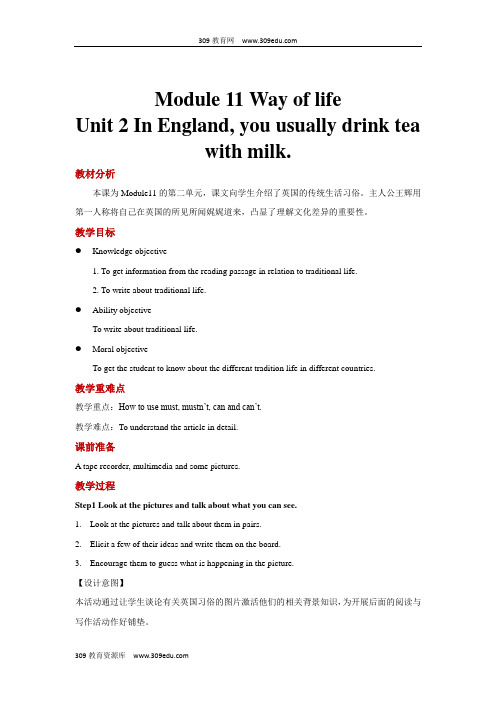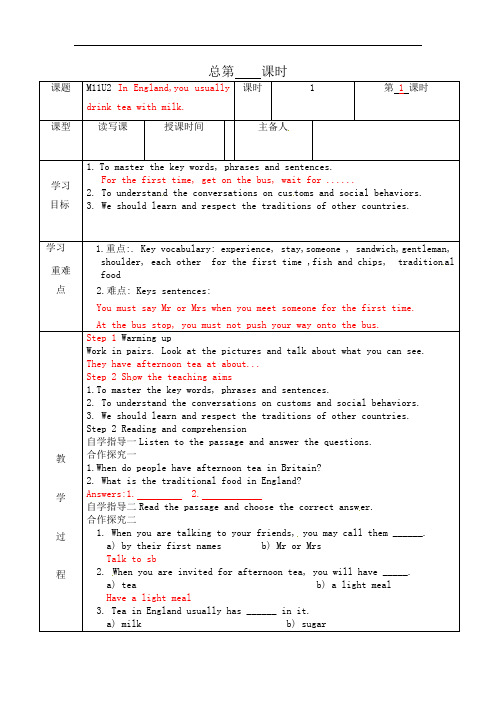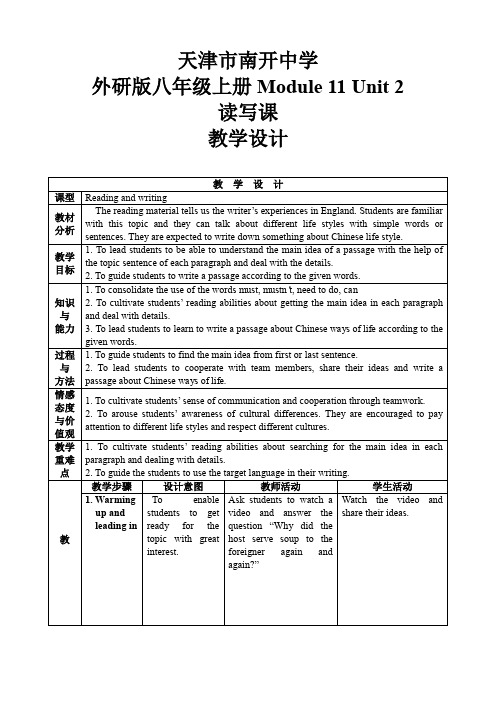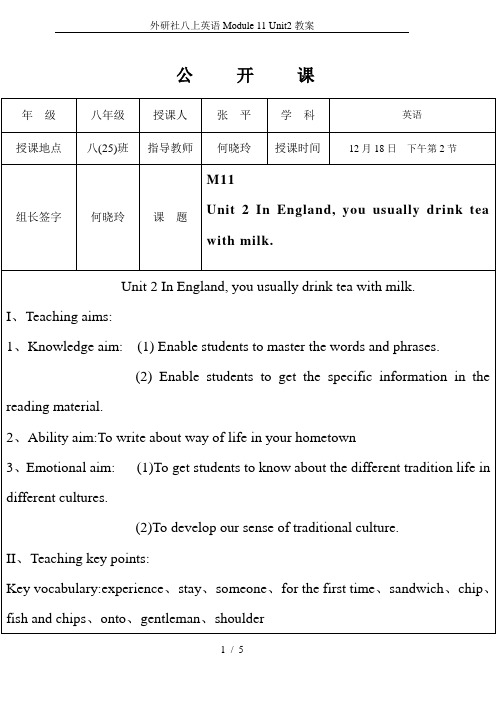外研版八上英语Module 11Unit 2教案
- 格式:doc
- 大小:39.54 KB
- 文档页数:5

外研版八年级英语上册Module 11 unit 2 In England,you usually drink tea with milk.教案(表格式)英语八年级上Module11 Unit2教学设计教学内容分析课题《英语》外研版八年级上册Module 11 Way of life Unit 2 In England, you usually drink tea with milk.课型Reading and writing教学目标语言知识目标vocabulary: experience, stay, for the first time, shoulder structures: …you must say Mr or Mrs when you meet someone for the first time. You can buy it and eat it in special fish and chip shops on high street, or you can take it away and eat it with your fingers! At the bus stop you must not push your way onto the bus.语言技能目标 1.To extract specific information from the reading passage 2. To master the skills of reading 3. To write about customs in your hometown情感目标了解并尊重其他国家的传统习俗和生活方式,增强跨文化意识,培养文化包容心。
教学重点1.To master the key vocabulary: experience, stay, for the first time, shoulder 2.To master the key structures: …you must say Mr or Mrswhen you meet someone for the first time. You can buy it and eat it in special fish and chip shops on high street, or you can take it away and eat it with your fingers! At the bus stop you must not push your way onto the bus.教学难点To write about customs in your hometown教学方法Task-based, Bottom-up approach教学手段Video, Reading pen, multi-media二、课堂教学过程时间教学步骤教学流程、师生活动教学意图3 mins Warming-up and Lead-in Discussion (show some beautiful pictures of England ): T: Would you like to go to England one day Ss: Yes. T: But you must obey some rules when you get there. What rules do you know about (Have Ss discuss with their group-mates) Do you know more customs in England Look at the pictures in A1 and talk about them. 通过让学生谈论有关英语习俗的图片激活他们的相关背景知识,为开展后面的阅读活动与写作活动做好铺垫。

Module 11 Way of lifeUnit 2 In England, you usually drink teawith milk.教材分析本课为Module11的第二单元,课文向学生介绍了英国的传统生活习俗。
主人公王辉用第一人称将自己在英国的所见所闻娓娓道来,凸显了理解文化差异的重要性。
教学目标●Knowledge objective1. To get information from the reading passage in relation to traditional life.2. To write about traditional life.●Ability objectiveTo write about traditional life.●Moral objectiveTo get the student to know about the different tradition life in different countries.教学重难点教学重点:How to use must, mustn’t, can and can’t.教学难点:To understand the article in detail.课前准备A tape recorder, multimedia and some pictures.教学过程Step1 Look at the pictures and talk about what you can see.1.Look at the pictures and talk about them in pairs.2.Elicit a few of their ideas and write them on the board.3.Encourage them to guess what is happening in the picture.【设计意图】本活动通过让学生谈论有关英国习俗的图片激活他们的相关背景知识,为开展后面的阅读与写作活动作好铺垫。

总第课时课题M11U2 In England,you usuallydrink tea with milk.课时 1 第1课时课型读写课授课时间主备人学习目标1.To master the key words, phrases and sentences.For the first time, get on the bus, wait for ......2. To understan d the conversations on cus toms and social behaviors.3. We should learn and respect the traditions of other countries.学习重难点1.重点:. Key vocabulary: experience, stay,someone , sandwich, g entleman, shoulder, each other for the first time ,fish and chips, tradition al food2.难点: Keys sentences:You must say Mr or Mrs when you meet someone for the first time.At the bus stop, you must not push your way onto the bus.教学过程Step 1 Warming upWork in pairs. Look at the pictures and talk about what you can see. They have afternoon tea at about...Step 2 Show the teaching aims1.To master the key words, phrases and sentences.2. To understand the conversations on customs and social behaviors.3. We should learn and respect the traditions of other countries. Step 2 Reading and comprehension自学指导一Listen to the passage and answer the questions.合作探究一1.When do people have afternoon tea in Britain?2. What is the traditional food in England?Answers:1. 2.自学指导二Read the passage and choose the correct answ er.合作探究二1. When you are talking to your friends, you may call them ______.a) by their first names b) Mr or MrsTalk to sb2. When you are invited for afternoon tea, you will have _____.a) tea b) a light mealHave a light meal3. Tea in England usually has ______ in it.a) milk b) sugar教学过程4. ______ is traditional food in England.a) Steak and potatoesb) Fish and chips5. At the bus stop, it is important that you ______.a) wait in a lineb) smile politelyIt is +adj. +that 从句自学指导三Write answers to the questions. Use the words and expressions in the box.(Discuss in groups)合作探究三for the first time, meal, meet,something interesting(一些有趣的东西), stand in a line, take away1. What did Wang Hui notice when he was in England?2. What is one example of the English way of life?3. What do you eat for afternoon tea?4. How can you eat fis h and chips?5. What do people do when they wait for the bus?Answers:1.He noticed something interesting with the English way of life.2.You must say Mr or Mrs when you meet someone for the first time.3. Afternoon tea is a light meal and you eat sandwiches or a large fruit cake, and drink tea with milk.4.You can eat fish and chips in shops or take it away and eat it with your fingers.5.When people wait for the bus, they need to stand in a line and wait for their turns.Step 3 Writing1. What do you do when you meet people for the first time?We may shake hands with each other or smile at each other when we meet for the first time.2. What must you say when you talk to older people?3. What food and drink do you give to visitors when they come to your home?4. What do you eat during the Spring Festival?Write a passage about ways of life in your home town.Step 4. Summary Summarize what have learned this lesson.Step 5 HomeworkWrite a passage to desc ribe what you should do at the bus s top.教学反思。


公开课年级八年级授课人张平学科英语授课地点八(25)班指导教师何晓玲授课时间12月18日下午第2节组长签字何晓玲课题M11Unit 2 In England, you usually drink tea with milk.Unit 2 In England, you usually drink tea with milk.I、Teaching aims:1、Knowledge aim: (1) Enable students to master the words and phrases.(2) Enable students to get the specific information in the reading material.2、Ability aim:To write about way of life in your hometown3、Emotional aim: (1)To get students to know about the different tradition life in different cultures.(2)To develop our sense of traditional culture.II、Teaching key points:Key vocabulary:experience、stay、someone、for the first time、sandwich、chip、fish and chips、onto、gentleman、shoulderKey structures: (1)You must say Mr or Mrs when you meet someone for the first time.(2)You can buy it and eat it in special fish and chip shops on the high street, or you can take it away and eat it with your fingers!(3)At the bus stop you must not push your way onto the bus.III、Teaching aids: A tape recorder, multimedia and some picturesIV、Teaching method: Communicative approach、PWP method, task-based method. V、Teaching procedures:Step 1、Warm up and lead in1、Show students some pictures about England and then watch a short video about the way of life in England.2、Have a discussion of different ways of life.3、Actually, in different countries, people have different ways of life,. So do you want to know the way of life in England? Then lead in the title of unit2. Step 2 Consolidate new words1、Watch pictures on PPT,then learn some new words: experience, stay, for the first time, shoulder2、Teacher shows the pictures of new words and let the students to say as quickly as possible.3、Pratice in pairs and choose the best group.Step 3、Reading and listening(Activity2)1、Before reading:(1)Show pictures in Activity 1,then let them talk about the pictures:What can you see in the pictures?(2) Let students share their ideas with each other.(3) Listen to the passage and answer the following questions.a、What did Wang Hui notice when he was in England?b、When do people have afternoon tea in Britain?c、What is the traditional food in England?d、What must you do when you are waiting for the bus at the station in England?2、While reading:(1) Ask students to scan the passage and finish activity 3.(2) Work in pairs and check in individually.(3) Check true or false.3、Post reading:(1) Give students some time to prepare and then tell the life in England.(2) Choose the best group.Step 5、Summary and homework1、Give a short brief summary of this lesson.2、Read the passage after school and remember the new words.3、To finish writing your passage: Ways of life in my hometownVI、Blackboard design:Unit 2 In England, you usually drink tea with milk.New words and phrases:experience、stay、someone、for the first time、sandwich、chip、fish and chips、onto、gentleman、shoulderQuestions: (1) What did Wang Hui notice when he was in England?(2) When do people have afternoon tea in Britain?(3) What is the traditional food in England?VII、Teaching reflection:。

课文标题:Module11 Way of life单元名称:Unit2 In England, you always drink tea with milk.教材版本:外研社《新标准》授课年级:八年级上册一.教学内容分析本课谈论的是风俗习惯和风土人情这一话题。
初到一个国家,了解其文化是一个必不可少的过程,只有充分了解当地风土人情,才能更好的了解文化差异,更好的与他人相处。
本节课以王辉在英国的经历为线索,介绍了英国人的生活方式。
采取的是总-分的逻辑结构。
主人公王辉以第一人称将自己在英国的经历娓娓道来,凸显了文化差异的重要性。
二.教学目标1. 语言知识目标词汇:学会使用experience,shoulder等词汇短语:理解并尝试使用stand in a line, for the first time等语法:了解并熟练掌握must和can的用法。
2. 语言技能目标1. 能根据题目预测文本主要信息,了解文本结构。
2. 能通过默读获取文本主要信息,完成段意连线。
3. 能借助语义结构图根据所给情景复述转述课文。
4. 课后能连贯流畅地朗读课文。
5. 学生能学会情态动词的用法。
根据身边实际介绍中国生活方式。
3. 情感目标能够了解并尊重不同文化下的社会规则,学会辩证看待问题,学习其优点摒弃缺点。
三.教学重难点重点:情态动词can, must的用法。
难点:能够通过所学词汇短语和句子谈论中国的生活方式。
四.教学流程与设计意图Step 1 Leading in1.微课导入话题T: As we all know, there are many traditions in China. For example, weusually shake hands when we meet others. Do you know any othertraditions around you?S: ……T: Now let’s enjoy a short video and then tell me what the video shows us.…S: Different people have different ways.T: Yes. Today we will learn Module 11 Way of life unit 2 In England, youusually drink tea with milk. What does the word usually mean?S: often , always, most of timeT: Do we usually drink tea with milk in China? …T: Here are two pictures. Talk about what we can see.S: …【设计意图】1.激活话题背景,导入课题。
Module 11 Way of lifeUnit 2 In England, you usually drink tea with milk.一、教学目标1. 掌握词汇:eeone, for the first time, sandwich, gentleman, shoulder2. 掌握句型:(1) For eust say Mr or Mrs when you meet someone for the first time.(2) You can buy it and eat it in special fish and chip shops on the high street, or you can take it away and eat it with your fingers!(3) At the bus stop you must not push your way onto the bus.3. 学习和运用表达“民俗风情”的词汇及情态动词。
4. 能够读懂关于英语传统生活习俗的文章。
5. 能够写出介绍中国习俗的活动。
6. 能够增强跨文化意识,培养文化包容心。
二、教学重点及难点重点:掌握本篇文章,并能正确朗读。
难点:在了解本段文章的基础上,可以写出介绍中国习俗的小作文。
三、教学准备1. 多媒体设备和课件;2. 设计课后巩固练习;3. 教学图片。
四、教学过程Step 1 Warming-up1. T shows some pictures about Chinese traditions and asks the Ss to watch and talk about them.2. T shows some Chinese traditions and asks Ss to read.【设计意图】通过展示中国传统风俗图片,吸引学生注意力,导入新课。
Step 2 Pre-reading1. T shows some pictures one by one and asks the class to watch and read the new words.【设计意图】通过看图片学单词,帮助学生理解和记忆新单词。
Module 11 Way of lifeUnit 2 In England, you usually drink tea with milkI、Teaching aims1、Knowledge aim:(1) Enable students to master the words and phrases.(2) Enable students to get the specific information in the reading material.2、Ability aim:To write about way of life in your hometown3、Emotional aim:(1)To get students to know about the different tradition life in different cultures.(2)To develop our sense of traditional culture.II、Teaching key pointsKey vocabulary: experience、stay、someone、for the first time、sandwich、chip、fish and chips、onto、gentleman、shoulderKey structures: (1)You must say Mr or Mrs when you meet someone for the first time.(2)You can buy it and eat it in special fish and chip shops on the high street, or you can take it away and eat it with your fingers!(3)At the bus stop you must not push your way onto the bus.III、Teaching aidsA tape recorder, multimedia and some picturesIV、Teaching methodsCommunicative approach、PWP method, task-based method.V、Teaching procedures:Step 1 Fast readingT: From the title, we can know that today we’ll talk about way of life in England. There is a passage written by Wang Hui. He went to England last year and enjoyed his stay. At the same time, he noticed something interesting with the English way of life. Please write the passage and find out the answers to the questions.Q1: How many ways of life in England in this passage?Q2: What are they?Step 2 Deep readingT: We have known what Wang Hui talked about. This time, please read carefully andStep 3 ReadingT: Please read the passage correctly, loudly and beautifully.Step 4 Detail readingT: Please write down the key words according to the table. And retell the paragraph. If necessary, there is a structure or a picture.Step 5 Discuss ways of life in your home town.T: We have known many ways of life in England. Let’s discuss ways of life in our home town.1 What do you do when you meet people for the first time?2 What must you say when you talk to older people?3 What food and drink do you give to visitors when they come to your home?4 What do you eat during the Spring Festival?Step 6 Homework全品M11U2 报纸M11U2VI、Blackboard designVII、Teaching reflectionLanguage Points:1. It’s good/bad manners to do sth.=It’s polite/impolite/rude (of sb.) to do sth. It’s good manner s to offer your seat to the old on the bus. 在公交车上让座是有礼貌的。
Teaching Plan for Module 11 Unit 2In England, you usually drink tea with milk.I. Teaching aims:1.To listen and understand the passage about the social rules, customsand traditions in England.2.To learn some key words and useful expressions.3.To get specific information from the reading material.4.To learn and respect the traditions of other countries.II.Student analysis:The students have just known some customs.They should use need/ needn’t/must to write something about the customs in their home town. III. Important points:1.Key words:experience,stay,someone, onto, gentleman, shoulder, sandwich, chips, fish and chips2.Key phrases:for the first time, not just … but… , take away , touch sb on the shoulder VI.Difficult points:1.Getting specific information from the reading material.2. Giving advice about customs and rules in their home town.V.Teaching procedures:1.Watch a video about England.2. Learn the new words and expressions.3. Talk about the two pictures in Activity 1.4. Listen to the passage in Activity 2 and choose the answers in Activity3.5. Watch the video for Activity 2 to get more information and thencheck the answers in Activity 3.6. Read aloud the passage together with the tape.7. Learn some useful expressions in the passage.8. Find out some phrases in the passage and learn.9. Ask and answer in pairs for Activity 4 and check the answers.10.Discussion for Activity 5 and write down the answers. Then studentstry to write an email to talk about ways of life in China.11. Sum up what we have learned in this unit.12. Homework:1) Recite the passage in Act.2 and try to retell the customs andtraditions in England.2) Write an email to talk about ways of life in China.Module 11 Unit 2 In England , you drink tea with milk.Exercises:I.Learn some useful expressions in Act.2 .1) for the first time: 首次,第一次。
外研版八上英语Unit 2 In England, you usually drink tea with milk.【教学目标】●Knowledge objective1. To get information from the reading passage in relation to traditional life.2. To write about traditional life.●Ability objectiveTo write about traditional life.●Moral objectiveTo get the student to know about the different tradition life in different countries. 【教学重点】How to use must, mustn’t, can and can’t.【教学难点】To understand the article in detail.【教学方法】PWP method, task-based method.【教学手段】A tape recorder, multimedia and some pictures【教学过程】Teaching Procedures:Step 1 RevisionLook at the pictures and let Ss fill in the blanks with must/can…Step 2 Learn new wordsLook and say. The teacher shows the pictures of new words and let the students to say as quickly as possible.Step 3 Look at the pictures and talk about what you can seeLook at the pictures and talk about in pairs.Step 4 ListeningListen to the passage and answer the questions.1. When do people have afternoon tea in Britain?2.What is the traditional food in England?Step 5 ReadingFirst let the Ss read the passage carefully and choose the correct answers, and then check the answers.1. When you are talking to your friends, you may call them ______.a) by their first names b) Mr or Mrs2. When you are invited for afternoon tea, you will have _____.a) tea3. Tea in England usually has ______ in it.a) milk b) sugar4. ______ is traditional food in England.a) Steak and potatoesb) Fish and chips5. At the bus stop, it is important that you ______.a) wait in lineb) smile politelyStep 6 PracticeWrite answers to the questions. Use the words from the box.for the first time meal meetsomething interesting stand in a line take away1. What did Wang Hui notice when he was in England?2. What is one example of the English way of life?3. What do you eat for afternoon tea?4. How can you eat fish and chips?5. What do people do when they wait for the bus?Step 7 Language points1. My experiences in Englandexperience作名词,表示“经验”时是不可数名词;表示“经历”时是可数名词。
如:Experience is the best teacher.经验是最好的老师Please tell us your experiences in Africa.请告诉我们你在非洲的经历。
2. I enjoyed my stay, …stay作动词,可以表示“保持;停留”;还可以作名词,表示“逗留;停留”。
如:Here are some ways for you to stay healthy.这里有一些供你保持健康的方法。
I stayed late at the party last night.昨晚我在派对上待到很晚。
Diana made a few friends during her stay in the village.Diana在她在农村生活的这段期间交到了一些朋友。
3. For example, you must say Mr and Mrs when you meet someone for the first time. someone pron. 某人;有人e.g. I seem to hear someone knocking at the door. 我好像听到有人在敲门。
for the first time表示“初次,第一次”。
e.g. I met him at the cinema for the first time.我第一次碰到他是在电影院里。
4. Afternoon tea is not just a drink but a light meal at around 4 pm.not just … but …表示“不仅仅……而且……”e.g. He is not just a teacher but an inventor.他不仅是位老师,而且还是个发明家。
5. … or you can take it away and eat it with your fingers!take away在这里特指将餐馆的食品带走,而不是在餐馆食用。
e.g. — Would you eat it here or take it away?—I’ll take it away.—你是想在这里吃,还是带走?—我要带走。
因此在英国,外卖食品被称为“takeaway”e.g. The restaurant provides takeaway service.这个饭店提供外卖服务。
6. Once I noticed a gentleman touch a young man on the shoulder…touch sb. on the should表示“拍某人的肩膀”,是英语的惯用表达,其他类似的表达例子如:pat sb. on the head 拍某人的头kick sb. in the leg 踢某人的腿Step 8 Writing1. Answer the questions about way of life in your home town.1. What do you do when you meet people for the first time?2. What must you say when you talk to older people?3. What food and drink do you give to visitors when they come to your home?4. What do you eat during the Spring Festival?2. Write a passage about ways of life in your home town. Use your answers in Activities 5 to help you.Step 9 GrammarTo master the usage of need/had better.need的用法need作为情态动词表示“需要”,可用于肯定句、否定句和疑问句。
否定形式needn’t比较常用,表示“不需要”,或“不必要”。
例如:You needn’t wait.你不需要等待。
请注意:need也可以作为行为动词,表示“需要”,常用need to do sth.结构。
例如:I need to clean my room immediately.我需要立即打扫我的屋子。
had better的用法had better表示劝告或建议,意为“最好……”。
例如:You’d better speak in a low voice. 你最好低点说话。
had better一般不用于疑问句中,但可用于否定句中,其否定形式为:had better not.例如:You’d better not go out before you finish your homework.在完成你的家庭作业之前,最好不要出去。
Step 10 ExercisesLet the students practice the main points in Unit 2.1. It rained heavily, so we ___ stay at home watching TV all day.A. couldB. had toC. must2. — May I take the book out of the reading room?—No, you can’t. You ___ read it here. It’s the rule.A. mustB. wouldC. may3. — Dad, may I watch TV?— No. You __ finish your homework first.A. mustB. canC. may4. — Bob, shall we go and meet our new classmate?— Sorry. I'm busy now. But you ____ ask David to go with you. He is free.A. needB. mayC. mustStep 11 HomeworkWrite a passage to describe what you should do at the bus stop.。